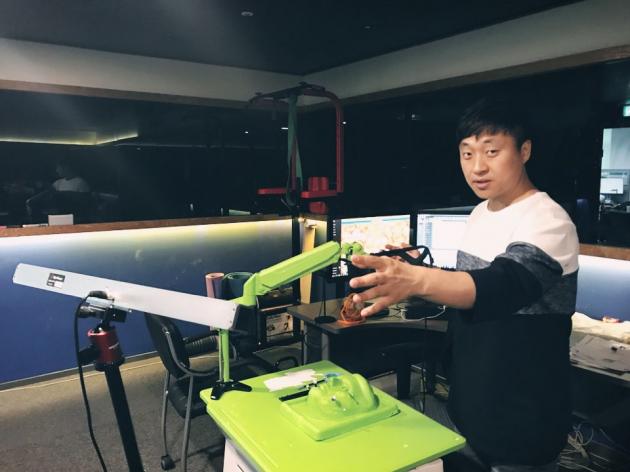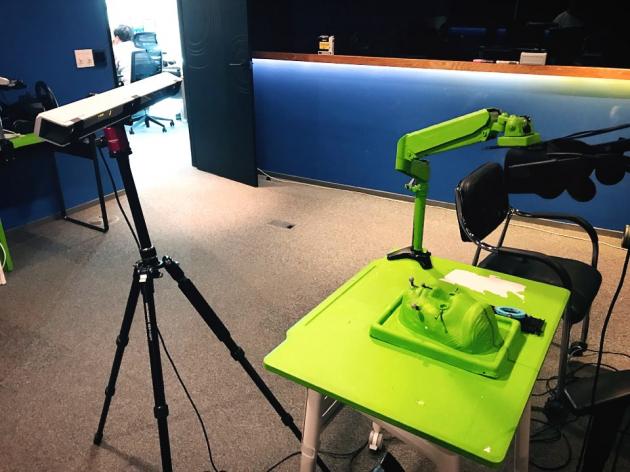“If DaVinci stands for surgical robots, Surgical Mind will represent virtual reality-based microsurgery training solutions.”

So said Kim Il, founder and CEO of Surgical Mind, a virtual reality (VR)-based medical training device and software developing start-up. Kim, an entrepreneur with extensive background in the gaming industry, founded the firm as a branch of its parent video game company Mania Mind, in 2017.
"I began my career at a video game developing firm but began to have interest in virtual reality. At the time, I received a request from a former colleague who worked at a medical firm to develop virtual reality content for psychiatry,” Kim said. “While helping him, I began to see VR would have a much bigger impact in the healthcare area, especially for cataract surgery.”
Kim has since set his sight on revolutionizing medical training by blending the spheres of virtual reality and reality itself.
“Existing medical training simulators focus on accuracy. People in VR are confined to the virtual space. Our VR technology goes one step further and fuses real space with virtual reality,” Kim said. “The space you look at in virtual reality and the space you move in real-life get matched into one.”
Surgical Mind is developing a VR-based microsurgery training service solution for cataract surgery based on innovative software that uses motion capture technology.
Cataracts cause blurry vision and increase the glare from lights. Surgery for the condition removes the lens of the eye and replaces it with an artificial lens. The surgery is one of the most commonly performed ones in Korea with National Health Insurance Service data showing about 360,000 people undergoing surgery in 2016 alone. “Hands-on” practice of an estimated 20,000 hours is often required but is becoming increasingly difficult due to the lack of time and resources.
Surgical simulators in cataract surgery training have become a prevalent trend, resulting in improved performance and fewer complications. Multinational firms such as VRmagic are putting out surgical simulator products such as Eyesi Surgical that fetch 400 million won ($3,600) to 500 million won – a price that remains out of reach for many domestic hospitals due to the lack of reimbursement.
Most are also hardware-based, making the products larger and more expensive. For these reasons, medical residents are limited to practicing on pig eyes or peeling tomato skins.
Surgical Mind aims to solve that problem with its software-based VR surgical simulator that touts high-quality, low price, and broad application.
“Medical residents around the world lack time for training. Simulators can help there, but existing simulators are too expensive and limited in function. Adding VR maintains the quality while expanding it from hardware-based to platform-based to help relieve stress and increase surgery performance,” Kim said.
The VR Cataract Training Solution allows a medical resident to sit down at the device, look into a visual reality head-mounted display (HMD) that replicates an operating microscope and practice cataract surgery using a pen-like device that mimics surgical tools.

On the surgical table lies a prototype of the face that features the silicone eye, which replicates its physical properties and textures. The resident will be able to move the surgical tool pen, which will be recognized by motion capture technology, to mimic a real-life surgery with unparalleled accuracy, Kim noted.
Most cataract training solutions use hardware to increase the accuracy of real-time movement. However, according to Kim, it is difficult to create a precise environment of less than 1mm with VR HMDs alone. The location of hand controllers also cannot be pinpointed at times due to noise.
By using a combination of optical-based motion capture technology and virtual reality, the VR Cataract Training Solution makes up for these deficits found in existing hardware-based VR solutions such as Oculus Rift CV1 and HTC vive. The VR Cataract Training Solution touts less than 1mm difference with real-time movement due to drastically reduced noise.
Kim intends to expand the range of use to microsurgeries, including the big four in ophthalmology, ENT, neurology, and cosmetic surgery. The firm is set to test out its first prototype in the department of ophthalmology in collaboration with Yonsei Severance Hospital, in August.
Upon testing and confirming the training solution at Severance, Kim will expand the testing to Vietnam to further affirm its efficacy. Surgical Mind, which has opened an office in China, also aims to advance to Australia next year and expand globally. The firm is also working with Altair to develop real-time physics simulation solutions.
Kim doesn’t intend just to develop an innovative surgical training solution but also aims to change the medical paradigm by changing the business model surrounding medical training simulators.
“Existing hardware-based simulators are focused on selling the product. For expensive products such as Eyesi Surgical, selling it is enough. In the gaming and software industry console package games and PC tool software firms in the ’90s focused on sales only as well,” Kim said. “The problem was that people didn’t buy the updated versions. So they changed their business model to service subscriptions.”
By benchmarking his experience in the gaming sector, Kim said Surgical Mind also aims to change the business paradigm from product sales to service subscriptions, and become a universal solution for microsurgery training around the world.

